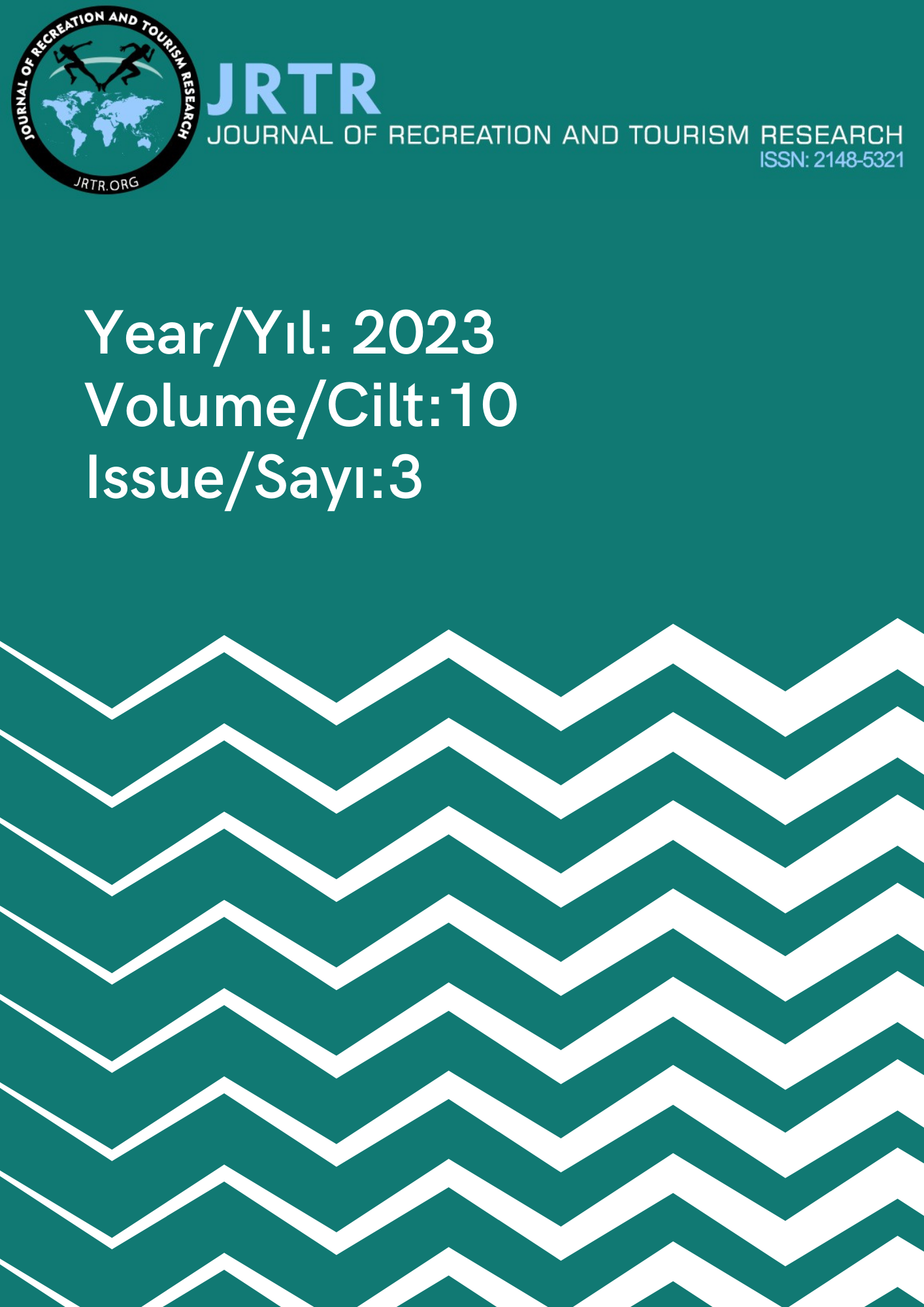Bibliometric Analysis of Graduate Thesis on Turkish Coffee As a Cultural Heritage
DOI:
https://doi.org/10.5281/zenodo.8393231Keywords:
Cultural Heritage, Turkish Coffee, Bibliometric AnalysisAbstract
The aim of this research is to conduct a bibliometric analysis on postgraduate theses related to Turkish coffee, which has a very important place in Turkish cuisine, culture and society and has cultural heritage value in this context. The research used data acquired from the utilization of the phrase "Turkish Coffee" in the YÖK thesis search engine over the period spanning from April 24 to May 11, 2023. In this context, 28 postgraduate theses were reached. In the examination of bibliometric features of graduate theses; thesis type, distribution by years, basic area, university, advisor title, research method, number of thesis pages and keywords were determined as criteria. Based on the findings of the study, it is evident that a significant proportion of the theses under consideration are at the master's level. Furthermore, a notable observation is that the bulk of these theses were published in the year 2022. The main focus of the theses is food engineering, with Istanbul Okan University being the institution with the highest number of theses. The advisors of these theses hold the title of Professor, and the research method employed is quantitative. The distribution of theses based on their length reveals an equal number of theses falling within the 0-100 page range and the 101-150 page range. Moreover, it is noteworthy that Turkish coffee is extensively utilized as a keyword in these theses.
Downloads
References
Acar, N., Çakırbaş, A. ve Çi̇zmeci̇, B. (2019). Türk kahvesi tüketilen mekânların seçimini etkileyen faktörlerin belirlenmesi: Nevşehir örneği. Anemon Muş Alparslan Üniversitesi Sosyal Bilimler Dergisi, 7(1), 135-143. https://doi.org/10.18506/anemon.425801
Akarçay, E. (2014). Kâh kahvehane kâh café: Küreselleşen Eskişehir’de kahve tüketimi üzerine kuramsal bir giriş. Galatasaray Üniversitesi İletişim Dergisi, 2, 181-202.
Argan, M., Akyıldız, M., Özdemir, B., Baş, A., Akkuş, E. ve Kaya, S. (2015). Leisure aspects of Turkish coffee consumption rituals: An exploratory qualitative study. International Journal of Health and Economic Development, 1(1), 26-36.
Atik, D., Aktan, D. ve Çam, E. (2022). Fortune-telling as a leisure activity. World Leisure Journal, 64(2), 142-155. DOI: 10.1080/16078055.2021.1919921
Cobo, M. J., López-Herrera, A. G., Herrera-Viedma, E. ve Herrera, F. (2011). Science mapping software tools: Review, analysis, and cooperative study among tools. Journal of the American Society for InformationScience and Technology, 62(7), 1382–1402. https://doi.org/10.1002/asi.21525
Fendal, D. (2014). Türkiye’deki kahve ve mutfak kültürünün dönüşümü üzerinden küreselleşme sürecinde küresel ve yerel kültürün etkileşim ve eklemlenişi. Galatasaray Üniversitesi İletişim Dergisi, 2, 147-180.
Girginol, C. R. (2017). Kahve topraktan fincana. A7 Yayınları.
Gürsoy, D. (2004). Tarihin süzgecinde mutfak kültürümüz. Boyut Matbaacılık.
Gürsoy, D. (2005). Sohbetin bahanesi kahve. Oğlak Yayıncılık.
Heise, U. (2001). Kahve ve kahvehane. Dost Yayınları.
Hussain, A., Fatima, N. ve Kumar, D. (2011). Bibliometric analysis of the 'Electronic Library' journal (2000-2010). Webology, 8(1): 1-11.
ICO (2023). International coffee organization monthly coffee market report. http://www.ico.org/Market-Report-22-23-e.asp
Işın, E. (2001). Tanede saklı keyif, kahve. Yapı Kredi Yayınları.
Karaman, N., Kılıç, A. ve Avcıkurt, C. (2019). Tüketicilerin kahve kafeleri ziyaret eğimlimlerinin ve değişen kahve tüketim alışkanlıklarının belirlenmesi: Geleneksel Türk kahvesi üzerine bir araştırma. Türk Turizm Araştırmaları Dergisi, 3(3), 612-632. https://doi.org/10.26677/TR1010.2019.181
Küçükkömürler, S. ve Özgen, L. (2009). Coffee and Turkish coffee culture. Pakistan Journal of Nutrition, 8(10), 1693-1700. https://doi.org/10.3923/pjn.2009.1693.1700.
Omerzel, D. G. (2016). A systematic review of research oninnovation in hospitality and tourism. International Journal of Contemporary Hospitality Management, 28(3), 516–558. https://doi.org/10.1108/ijchm-10-2014-0510
Tarbuck Gürses, D. (2011). Kahvehanelerin Avrupa düşünce tarihindeki yeri üzerine. Cogito, 68-69, 317-326.
Toros, T. 1998. “Kahvenin öyküsü (The history of coffee)”, İletişim Yayınları, İstanbul.
Ulusoy, K (2011). Türk toplum hayatında yaşatılan kahve ve kahvehane kültürü. Milli Folklor Dergisi, 12(89), 159-169.
UNESCO (2013). Turkish coffee culture and tradition. https://ich.unesco.org/en/RL/turkish-coffee-culture-and-tradition-00645
Woyesa, T. ve Kumar, S. (2020). Potential of coffee tourism for rural development in Ethiopia: A sustainable livelihood approach. Environment, Development and Sustainability, 23, 815-832 https://doi.org/10.1007/s10668-020-00610-7.
Yiğit, S. ve Şahin Perçin, N. (2021). How would you like your Turkish coffee? Tourist experiences of Turkish coffee houses in Istanbul. International Journal of Culture, Tourism and Hospitality Research, 15(3), 443-454. https://doi.org/10.1108/IJCTHR-11-2020-0274
Yildirim, O. ve Karaca, O.B. (2022). The consumption of tea and coffee in Turkey and emerging new trends. Journal of Ethnic Foods 9(8), 1-11. https://doi.org/10.1186/s42779-022-00124-9
Yılmaz, B., Acar Tek, N. ve Sözlü, S. (2017). Turkish cultural heritage: a cup of coffee. Journal of Ethnic Foods, 4, 213-220. https://doi.org/10.1016/j.jef.2017.11.003
Yönet Eren, F. ve Ceyhun Sezgin, A. (2018). Kültürel miras açısından Türk kahvesi. Turkish Studies Social Sciences, 13(10), 967-712. http://dx.doi.org/10.7827/TurkishStudies.12880
Downloads
Published
How to Cite
Issue
Section
License
Copyright (c) 2023 Journal of Recreation and Tourism Research

This work is licensed under a Creative Commons Attribution-NonCommercial 4.0 International License.






